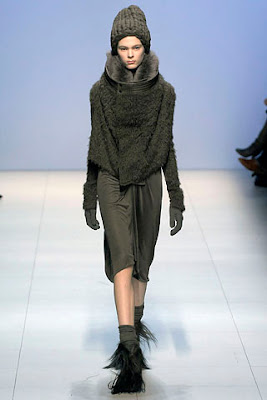
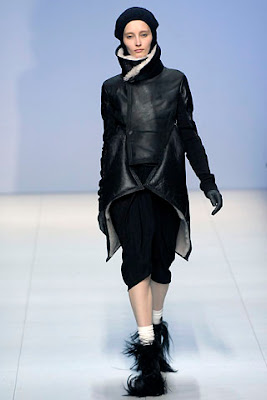
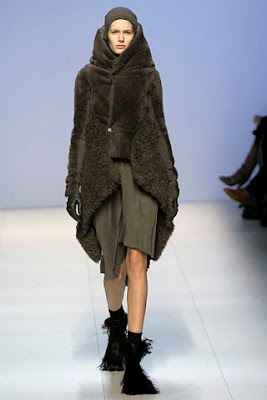






 I like M.M. take on volumes, power, and fantasy. I see a collection inspired in a strong but totally playful and heroic woman. LOVE the neon boots. source
I like M.M. take on volumes, power, and fantasy. I see a collection inspired in a strong but totally playful and heroic woman. LOVE the neon boots. source






 I adore animals, in fact I think they are divine creatures. I dare to say Jesus has come as a cow and is among us. The following parrot kind of says it:
I adore animals, in fact I think they are divine creatures. I dare to say Jesus has come as a cow and is among us. The following parrot kind of says it:The bird, a captive African grey called N'kisi, has a vocabulary of 950 words, and shows signs of a sense of humour.
He invents his own words and phrases if he is confronted with novel ideas with which his existing repertoire cannot cope - just as a human child would do.
N'kisi's remarkable abilities feature in the latest BBC Wildlife Magazine.
N'kisi is believed to be one of the most advanced users of human language in the animal world.
About 100 words are needed for half of all reading in English, so if N'kisi could read he would be able to cope with a wide range of material.
Polished wordsmith
He uses words in context, with past, present and future tenses, and is often inventive.
One N'kisi-ism was "flied" for "flew", and another "pretty smell medicine" to describe the aromatherapy oils used by his owner, an artist based in New York.
When he first met Dr Jane Goodall, the renowned chimpanzee expert, after seeing her in a picture with apes, N'kisi said: "Got a chimp?"
He appears to fancy himself as a humourist. When another parrot hung upside down from its perch, he commented: "You got to put this bird on the camera."
Dr Goodall says N'kisi's verbal fireworks are an "outstanding example of interspecies communication".
In an experiment, the bird and his owner were put in separate rooms and filmed as the artist opened random envelopes containing picture cards.
Analysis showed the parrot had used appropriate keywords three times more often than would be likely by chance.
Captives' frustrations
This was despite the researchers discounting responses like "What ya doing on the phone?" when N'kisi saw a card of a man with a telephone, and "Can I give you a hug?" with one of a couple embracing.
Professor Donald Broom, of the University of Cambridge's School of Veterinary Medicine, said: "The more we look at the cognitive abilities of animals, the more advanced they appear, and the biggest leap of all has been with parrots."
Alison Hales, of the World Parrot Trust, told BBC News Online: "N'kisi's amazing vocabulary and sense of humour should make everyone who has a pet parrot consider whether they are meeting its needs.
"They may not be able to ask directly, but parrots are long-lived, and a bit of research now could mean an improved quality of life for years."
All images courtesy and copyright of Grace Roselli." SOURCE
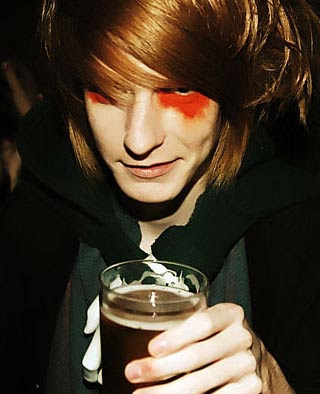
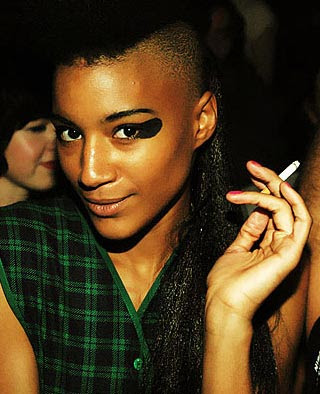
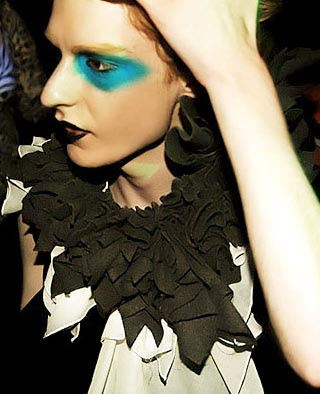








 "The end of the century saw the advent of mass advertising. Chromolithography as an artistic medium provided possibilities for mass communication that printers and artists were quick to take advantage of. Perhaps the most crucial development for advertising in the twentieth century was the realization that the successful advertisement sold an idea or lifestyle rather than a product -- and sex sold products better than anything else. Just as the promise of sex could fill the theatres of Paris, so sex could sell anything from cigarettes and cars to painting and poetry. The erotic content in Art Nouveau advertising ranged from the subtle to the explicit. Designers did not just aim to sell the promise of sexual fulfillment to a male audience, but also, and extremely significantly, they were selling the idea of a sophisticated, decorative and glamorous identity to women -- increasingly the dominant consumers. As it was women who often held the domestic purse strings, it was they who came to be associated with shopping.The theme of objects fulfilling a sexual need was not a new one, although it found particular resonance in the fin de siècle. In Leopold von Sacher-Masoch's novel Venus in Furs, Severin describes his lust for an inanimate sculpture of Venus: 'I love her madly, passionately with a feverish intensity, as one can only love a woman who responds to one with a petrified smile... Often at night I pay a visit to my cold, cruel beloved; clasping her knees, I press my face against her cold pedestal and worship her'. The de Goncourt brothers wrote of the erotic fascination of their Rococo objects, developing an overtly sexual and torturous relationship with them: Jules recorded his dreams of 'raping a delicate young woman who resembled one of his rococo porcelain figurines. Edmond wrote of caressing his Clodion statuette as if her stomach and neck had the touch of real skin'. The fetishistic concentration on the erotic potential of the object is implicit in much Art Nouveau.
"The end of the century saw the advent of mass advertising. Chromolithography as an artistic medium provided possibilities for mass communication that printers and artists were quick to take advantage of. Perhaps the most crucial development for advertising in the twentieth century was the realization that the successful advertisement sold an idea or lifestyle rather than a product -- and sex sold products better than anything else. Just as the promise of sex could fill the theatres of Paris, so sex could sell anything from cigarettes and cars to painting and poetry. The erotic content in Art Nouveau advertising ranged from the subtle to the explicit. Designers did not just aim to sell the promise of sexual fulfillment to a male audience, but also, and extremely significantly, they were selling the idea of a sophisticated, decorative and glamorous identity to women -- increasingly the dominant consumers. As it was women who often held the domestic purse strings, it was they who came to be associated with shopping.The theme of objects fulfilling a sexual need was not a new one, although it found particular resonance in the fin de siècle. In Leopold von Sacher-Masoch's novel Venus in Furs, Severin describes his lust for an inanimate sculpture of Venus: 'I love her madly, passionately with a feverish intensity, as one can only love a woman who responds to one with a petrified smile... Often at night I pay a visit to my cold, cruel beloved; clasping her knees, I press my face against her cold pedestal and worship her'. The de Goncourt brothers wrote of the erotic fascination of their Rococo objects, developing an overtly sexual and torturous relationship with them: Jules recorded his dreams of 'raping a delicate young woman who resembled one of his rococo porcelain figurines. Edmond wrote of caressing his Clodion statuette as if her stomach and neck had the touch of real skin'. The fetishistic concentration on the erotic potential of the object is implicit in much Art Nouveau. A guerrilla campaign is taken as a terrorist attack. BUT how can you think this character is actually dangerous?! Apparently all authorities in Boston did. And to make things worse they are charging two dudes with terrorist charges to save face in front of a gigantic public ridicule.
A guerrilla campaign is taken as a terrorist attack. BUT how can you think this character is actually dangerous?! Apparently all authorities in Boston did. And to make things worse they are charging two dudes with terrorist charges to save face in front of a gigantic public ridicule.Highways, bridges and a section of the Charles River were shut down and bomb squads were sent in before authorities declared the devices were harmless.
"It's a hoax -- and it's not funny," said Gov. Deval Patrick, who said he'll speak to the state's attorney general "about what recourse we may have." "BOSTON, Feb 1 (Reuters) - Authorities charged two men on Thursday with planting battery-powered cartoon advertising signs that caused Boston's biggest security scare since the Sept. 11 attacks when they were mistaken for bombs. Investigators were also probing the role of U.S. media group Turner Broadcasting, which has apologized for Wednesday's day-long security scare triggered by a "guerrilla" marketing campaign for one of its cartoon television shows. Berdovsky -- a Belarus native with flowing dreadlocks -- and Stevens mocked the process in an appearance with reporters, insisting on talking about hairstyles from the 1970s rather than addressing questions about the incident. "We are only taking questions on hair," Berdovsky said." Source
Turner Broadcasting, a division of Time Warner Inc. and parent of Cartoon Network, said the devices were part of a promotion for the TV show "Aqua Teen Hunger Force," a surreal series about a talking milkshake, a box of fries and a meatball.
"The packages in question are magnetic lights that pose no danger," Turner said in a statement, issued a few hours after reports of the first devices came in.
It said the devices have been in place for two to three weeks in 10 cities: Boston, New York, Los Angeles, Chicago, Atlanta, Seattle, Portland, Ore., Austin, Texas, San Francisco and Philadelphia.
"We regret that they were mistakenly thought to pose any danger," the company said. "
The marketing company responsible for the campaign, Interference Inc., had no immediate comment. A woman who answered the phone at the New York-based firm's offices on Wednesday afternoon said the firm's CEO was out of town and would not be able to comment until Thursday." Source

 Saville uses the content of this very popular sign to make a comment on designers work.
Saville uses the content of this very popular sign to make a comment on designers work. "Elise Øverland may be a newcomer to the fashion week scene—her Milk Studios Penthouse installation goes up February 3—but she has friends in all the right places. Visionaire's Greg Foley is designing the set for what Øverland dubs her "dark but not Goth" collection; stylist Maryam Malakpour, long associated with the Rolling Stones, is working behind the seams; and Diego Garcia of Elefant is responsible for the music. Muses Aimee Mullins and Hope Atherton will be on hand to ensure that the people-watching isn't too shabby, either." source
"Elise Øverland may be a newcomer to the fashion week scene—her Milk Studios Penthouse installation goes up February 3—but she has friends in all the right places. Visionaire's Greg Foley is designing the set for what Øverland dubs her "dark but not Goth" collection; stylist Maryam Malakpour, long associated with the Rolling Stones, is working behind the seams; and Diego Garcia of Elefant is responsible for the music. Muses Aimee Mullins and Hope Atherton will be on hand to ensure that the people-watching isn't too shabby, either." source
